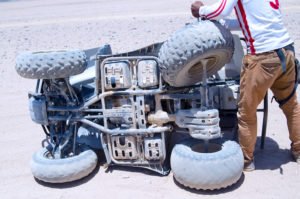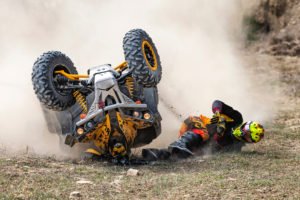
If you are injured in an ATV (all-terrain vehicle) accident in Nevada, you may be able to sue one or more of the following eight parties:
- The ATV driver that caused the accident (or the driver’s parents if the driver was underage);
- Any passengers of the ATV if their interference contributed to the accident,
- The owner of the ATV;
- The ATV manufacturer, if a defective part caused the accident;
- The ATV helmet manufacturer, if it failed to properly protect you;
- The ATV dealer, rental company, or maintenance company that sold, leased, or maintained the defective vehicle;
- Mechanics who may have damaged the ATV; and/or
- The landowner where the accident occurred if a property hazard caused the accident. In some cases, the landowner may be the government.
I can help you determine which parties are at fault so that everyone who caused your injuries is held responsible.
Possible legal claims
In my experience bringing ATV crash lawsuits in Nevada, the most common claims we bring against the responsible parties are:
- Negligence – where you are injured by the defendant’s breach of their duty of care;
- Negligence per se – where the defendant broke a law (such as a traffic code) that was meant to protect people like you;
- Defective design/products liability – where the ATV manufacturer created a defective product; and/or
- Wrongful death – where the family of an ATV crash victim sues the responsible party for damages.
I have seen many cases where the ATV driver was a young teenager or child who was not under parental supervision. Here, victims can sue the parents for negligence for not properly supervising their child.
Potential damages
If you are injured in an ATV accident in Nevada, I would seek to recover compensatory damages for your:
- Medical bills,
- Property damage,
- Lost wages,
- Loss of future earnings,
- Pain and suffering, and/or
- Loss of consortium (if the accident impacted intimate relations with your spouse).
In cases that go to trial, I would also fight for punitive damages if the behavior of the at-fault party (defendant) was particularly shocking or malicious. Nevada state law caps punitive damages at three times the amount of compensatory damages or at $100,000 – whichever is higher.1
The vast majority of lawsuits resolves out of court through negotiations alone with the defendants’ insurance companies. Defendants are often willing to offer a favorable settlement to avoid the bad publicity of a trial.

ATVs are a type of off-road motor vehicle/off-highway vehicle (OHV) with low-pressure tires ideal for rocky or dirt roads, trails, or dunes.
When you share some blame
Even if you were partly at fault for the ATV accident, Nevada’s modified comparative negligence law permits you to still recover damages. The only condition is that you were no more than 50% at fault.2
Example: You are biking on a trail when an ATV collides into you, causing you $100,000 in damages. The court finds that you were 50% at fault because you were listening to music and not wearing a helmet. Therefore, you could still recover up to $50,000 (half of $100,000).
Evidence I frequently rely on to place blame on the defendants include:
- police reports
- medical records
- accident reconstruction expert testimony
- eyewitness testimony
- video and photographs of the accident and your injuries
In my experience, it is an uphill battle for ATV drivers to win any damages if at the time of the crash they were intoxicated or driving the ATV on a public road, both of which are against Nevada law.
If you signed a liability waiver
Most ATV companies require you to sign a liability waiver before you can drive their vehicles. By signing, you waive the right to sue the company for negligence.
Even if you sign a liability waiver however, you can still sue the ATV company for:
- gross negligence (which is a more careless form of negligence),
- reckless conduct (which is an extreme disregard of others’ safety), and/or
- intentional or malicious conduct
This is true no matter what the liability waiver says.
Note that if a minor (under 18 years old) signed a liability waiver, it is unenforceable since minors cannot enter into contracts.3
Statute of limitations
In Nevada, the statute of limitations to file a lawsuit depends on the legal grounds:
|
Nevada legal claim in ATV cases |
Statute of limitations |
| Negligence for personal injury | 2 years after the ATV injury |
| Wrongful death | 2 years after the death |
| Property damage | 3 years after the crash |
| Product liability (for design defect) | 4 years after the crash |
The statute of limitations can pause (“toll”) in certain cases under Nevada law.4 Though ATV accident victims are encouraged to contact me as soon as possible because it takes time to craft an effective personal injury case.

ATV crashes can result in serious injuries such as traumatic brain injuries and spinal cord injuries. Some crashes result in fatalities to the ATV drivers.
What causes ATV accidents
In my experience, ten reasons ATV accidents occur are:
- drivers impaired by alcohol or drugs
- drivers who lack the training to drive ATVs
- reckless driving, overloading, or other driving violations
- driving on terrain – or at speeds – the ATV was not meant for including paved roads, steep drop-offs, and potholes
- colliding into trees, fences, or large rocks, or driving in bad weather
- mechanical problems, especially with the brakes, tires, throttle, and/or steering
- stunt driving
- lack of adult supervision of juvenile operators
- lack of – or ill-fitting – safety equipment (such as a helmet and harness)
- the ATV being too big for the operator (such as a minor), or the ATV being too small for carrying passengers
Note that similar to cars, ATVs get recalled all the time due to design defects. Some of the recent ones involved Honda, Yamaha, Polaris Industries, and Kawasaki.
ATV crash injuries
ATV crashes are often fatal, especially in rollover accidents since these vehicles lack exterior protection. Between 2016 and 2018, 33 people died in ATV accidents in Nevada.5
People who survive commonly sustain:
- fractures (especially broken ribs, which can in turn pierce the lungs, livers, kidney, pancreas, and other abdominal areas)
- head injuries
- traumatic brain injuries (TBIs)
- back/spinal cord injuries (SCIs)
- lacerations
- organ damage
- limb injuries, including amputations
- PTSD
During settlement talks, I make sure to fight for enough money to cover your past and future medical expenses. This may include extensive rehabilitation and home health care for life.
ATV driving rules
For ATVs operated off-highway in Nevada, there are no requirements regarding:
- minimum ages,
- driver’s licenses,
- insurance, or
- helmets.
If your local government permits you to drive the ATV on a road or highway, then you need to wear a helmet and abide by local ordinances. Local laws can require you to be at least 16 to drive an ATV on-highway without adult supervision.
In any case, you have to register and title your ATV with the Nevada Off-Highway Vehicle Program and display the decal on the ATV unless:
- the ATV is registered/certified in another state, and
- the ATV is in Nevada for 15 days or less.6
Definition of ATV
Under Nevada law, an all-terrain vehicle (ATV) is:
“a motor vehicle that is designed primarily for off-highway and all-terrain use. The term includes, but is not limited to: (a) An all-terrain vehicle; (b) An all-terrain motorcycle; (c) A dune buggy; (d) A snowmobile; and (e) Any motor vehicle used on public lands for the purpose of recreation.”7
ATVs typically have three or four low-pressure wheels with handlebars used for steering. Many people use them recreationally, though they are useful for surveying land, hunting game, and farming.

Nevada is home to many ATV trails in Nellis Dunes, Logandale, Eldorado Canyon, Valley of Fire, Jean Dry Lake Bed, Hidden Valley, Primm, Armagosa, Sand Mountain, the Apex area, and more.
Additional resources
For more information, refer to the following:
- Nevada Off-Highway Vehicles Program – Government website with trail maps and instructions for registering your ATVs.
- Travel Nevada – Information about dozens of off-road trails for ATVs.
- Consumer Product Safety Commission (CPSC) – ATV Safety – Statistics and safety tips for driving ATVs
- ATV Safety Institute – ATV laws state by state.
- ATVs Are Not Safe for Children: AAP Policy Explained – Article by HealthyChildren.org.
Learn more about my team of Las Vegas ATV accident lawyers.
Legal References
- Nevada Revised Statute 42.005.
- NRS 41.141.
- Restat 2d of Torts, § 496B. NRS 129.
- NRS 11.190. See also Ainsworth v. Combined Ins. Co., (1988) 104 Nev. 587, 763 P.2d 673. See also Cerminara v. California Hotel & Casino (1998), 104 Nev. 372, 760 P.2d 108.
- 2021 Report of Deaths and Injuries Involving Off-Highway Vehicles with More than Two Wheels, Consumer Product Safety Commission (November 2021).
- NRS 490.090, NRS 490.110, NRS 490.120, NRS 490.130.
- NRS 490.060.


